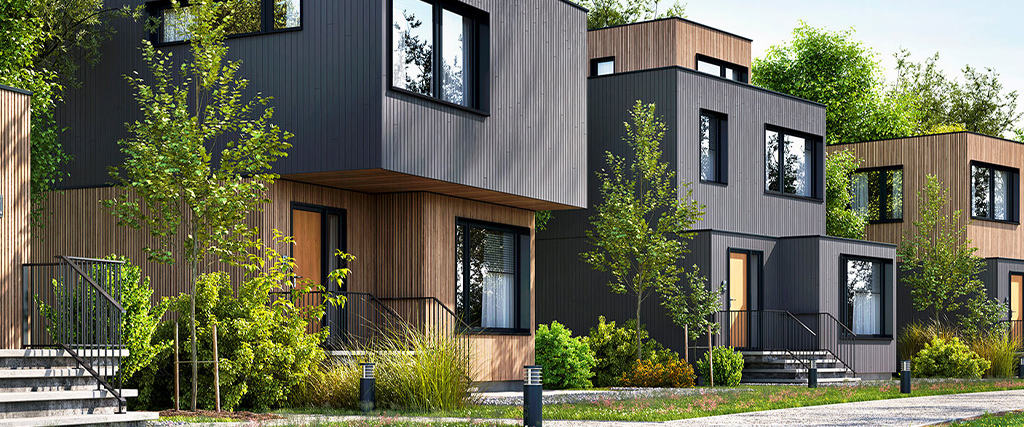Between the woes of rising home prices and a lack of new inventory, many eager home buyers are exploring newer, more accessible options for achieving home ownership. One increasingly popular choice among new homeowners is the modular home, a type of prefabricated housing designed to offer increased affordability, customizability, and even construction quality over conventional site-built homes. But what exactly is a modular home, and how does it compare to a traditional single-family home? Keep reading for all the information you need to answer these questions and decide if a modular home is right for you.
What is a Modular Home?
Modular homes are a type of prefabricated housing built in individual sections or modules in a factory and then transported to the site for assembly. Unlike other prefab units, modular homes are placed onto a permanent foundation during assembly, and are built to the same building codes and regulations as traditional homes. Because modular homes are composed of different modules or “pieces”, the buyer has much more freedom and control over the design, layout, and style of the final product.
The main difference between modular homes and other prefabricated housing is the construction process. Modular homes begin as individual modules built in a controlled factory environment, which allows for increased efficiency and quality control. Once the modules are completed in the factory, they are transported to the site and assembled to create the finished home. This assembly process typically takes a shorter amount of time compared to traditional home construction, as the modules are already built and only need to be connected together. The result is a quickly-built and affordable new home, custom-tailored to fit the buyer’s preferences and needs.
Despite these differences from traditional site-built homes, modular homes are subject to the same building codes and meet the same standards of quality and safety. However, like any manufactured product, quality of service and construction can vary between sellers, so it’s advisable to buy from a trusted builder.
Quality Construction
One major advantage of modular homes is the quality construction that scaled factory production provides. In addition to following the same building codes as regular homes, the controlled factory environment ensures that modular homes are consistently produced at a set quality standard. Reputable manufacturers also produce home modules using the same materials that regular home builders do, making sure that a completed modular home meets or exceeds the quality of a traditional one. Of course, this may vary between manufacturers, so it’s always a good idea to research and confirm a builder’s practices before choosing one.
Customizable Options
As their nature implies, modular homes offer customization and creative freedom far beyond a traditional home. The ability to choose and combine different modules provides a considerable number of potential floorplans, allowing homeowners to personalize their new living space. Modular homes also offer the flexibility of adding additional modules in the future, providing the option to expand and adapt your home over time. Meanwhile, regular homes often have limited options for expansion, especially in planned communities or developments. This is even truer of starter homes, which can be costly to expand with added square footage thanks to construction costs. Naturally, this leads us to the last and perhaps most attractive strength of modular construction: cost-effectiveness.
Affordability
Modular homes and their owners enjoy considerable advantages in cost and affordability over regular homes. According to SoFi, modular homes tend to be 10% to 20% cheaper than traditional homes. The simplicity and efficiency of large-scale factory production means modular homes can be constructed and assembled at much lower costs than traditional homes. In addition, housing modules made with high quality materials are often more energy-efficient thanks to more effective insulation, which results in savings on utility bills during summer or winter. The combination of these lower costs provides a home that’s not only more affordable to buy, but more affordable to live in as well. In contrast, regular homes can have higher construction costs due to the increased labor required. The potential for weather delays can also extend a new house’s required construction time, driving up the final cost even further.
Is a Modular Home Right for Me?
Modular homes can be a great option for new home buyers who want the option to expand in the future, but there are downsides to consider as well. You’ll need to work with a contractor to purchase a parcel of land for your modular home, and finding suitable land can be difficult. Purchasing a modular home might require a construction loan rather than a mortgage, and some lenders may not finance a modular home due to unfamiliarity and inexperience. Reselling a modular home can also be challenging due to their customization as well as public misconceptions about their quality and desirability.
If you’re considering a modular home but have reservations, it’s always a great idea to consult a real estate professional or financial advisor. Modular homes certainly aren’t for everyone, but they can be the perfect alternative to the costs and long-term commitments of a regular home.


 Facebook
Facebook
 X
X
 Pinterest
Pinterest
 Copy Link
Copy Link

